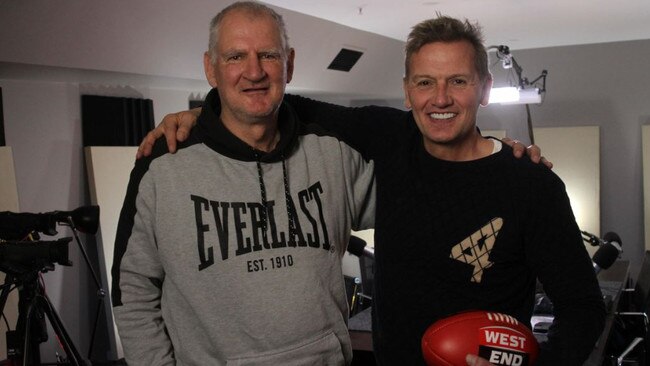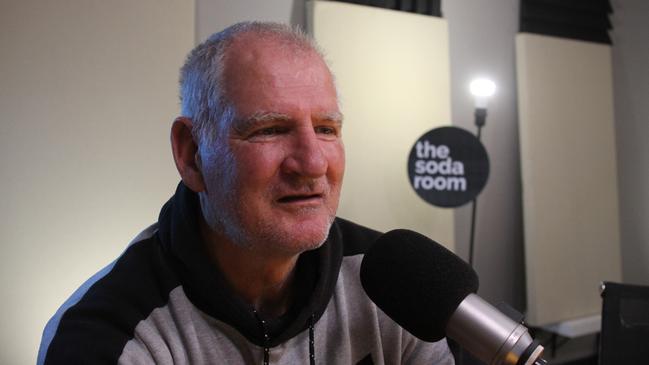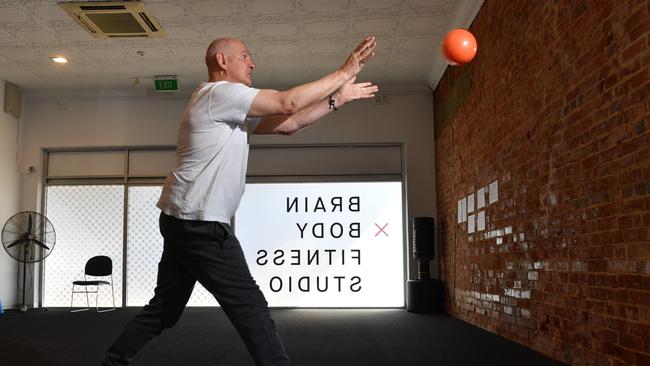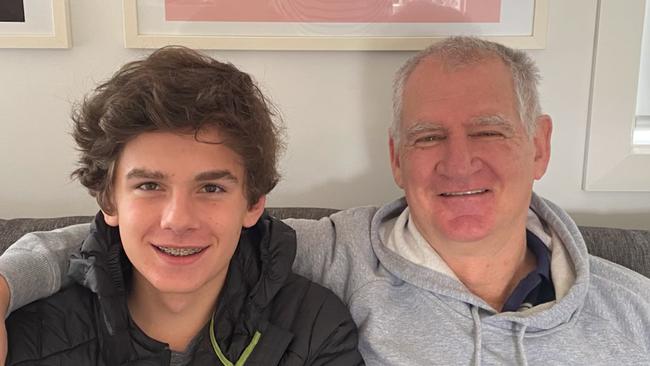The Soda Room podcast: AFL legend Mark Mickan on the fight of his life, battling Parkinson’s
The former Adelaide best and fairest has told of how he’s battling the disease that saw his dad deteriorate, in a new podcast with Mark Soderstrom. Listen now.
AFL
Don't miss out on the headlines from AFL. Followed categories will be added to My News.
Adelaide Crows inaugural best and fairest Mark Mickan is relying on exercise, rather than medication, in his ongoing battle with Parkinson’s disease.
Mickan, 61, says he tries to keep his body moving as much as possible and is using the memory of his father Bill deteriorating with the same disease as motivation.
The West Adelaide premiership coach, who was coaching the Bloods when they ended a 32-year premiership drought in 2015, has also watched his brother and aunty battle Parkinson’s.
“Growing up and seeing my Dad deteriorate like he did has made me realise I’ve got to do everything I possibly can to not let that happen to me,” Mickan tells interviewer Mark Soderstrom on The Soda Room podcast.
“And exercise is probably the thing that I rely on the most because I don’t take any Parkinson’s drugs. I just rely on the operation and the exercise I do.”
Riverland product Mickan debuted with West Adelaide in 1981. He won the club best and fairest in 1983 but a knee injury late in the season robbed him of a chance to be part of the Bloods’ premiership side that same year.
SCROLL DOWN TO LISTEN TO THE PODCAST

He made his AFL debut as Brisbane Bears captain in 1987 and returned to Adelaide in 1991 where he won the Crows’ inaugural best and fairest award.
He was diagnosed with Parkinson’s in 2016 and underwent deep brain stimulation in 2019 to reduce the hand tremors caused by the disease. The first surgery, completed under general anaesthetic, failed because a probe inserted into his brain moved. A second surgery six months later, which reduced (but did not eliminate) the tremors occurred while he remained awake.
“At one stage I could feel them drilling into my head,” he said. “It wasn’t painful, it was just like a jackhammer at the back of my head.”
Mickan, an ambassador for Parkinson’s SA, said he had enjoyed tremendous support from his wife Callie and sons Fletcher, 15, and Spencer, 10, and maintaining a positive mindset was critical.
“The thing I’ve learnt the most is to stay as positive as you possibly can, to speak positive, to say yes more than you say no,” he said.
“And to keep moving. Because most conditions that people suffer from, they thrive on people who don’t do any work or exercise. And I’m not trying to blame anyone or say this in a negative way.
“But if you can find a way of getting yourself moving, physically, it’s an enormous help.
“Because if you move 10 metres today, you’ll be able to move toward 12 metres tomorrow, and so on. And just by continuing to exercise, you can get a quality of life that you might not realise is possible.”
MARK MICKAN SPEAKS TO MARK SODERSTROM IN THE SODA ROOM
The Soda Room is presented in collaboration with The Sunday Mail.
Below is an edited transcript of the podcast – listen in full in the player above.
Mark Soderstrom: Mark Mickan, welcome along. I’m very excited to hear you tell us your story, mate. I want to ask you about the Parkinson’s, because you’ve talked a lot about this. You win the SANFL flag with West Adelaide in 2015 and in 2016 you start noticing a little bit of a tremor. Were you feeling pretty dark at the time?
Mark Mickan: Yeah, I couldn’t get myself going really, I was feeling very flat, and you know, we weren’t going well either as a team. I couldn’t work out why and I still couldn’t work out why at the end of the year, but now I know why. I started to develop a little tremor in my right hand, and I went and got a doctor’s opinion and she was Angela Moran, our club doctor from a couple years ago. And she said you better go and see a neurologist. And so I did. He did a couple of simple tests, and diagnosed me with Parkinson’s. He said 80% chance you’ve got Parkinson’s. So I said to him, do you mind if I get another opinion. And I went to another guy, and he said, 80% chance you got Parkinson’s. After doing the same test. There’s no real science in the testing they do. They asked you to touch your nose with a finger, walk up and down a passage. They make you put your fingers and your thumbs together as fast as you can. And I thought I was going alright. I thought I was passing with flying colours. But not to be.

MS: That’s quite remarkable, such simple testing that both doctors came up with the exact diagnosis.
MM: It was and, and also Angela, she diagnosed me with depression as well, at the time. I was in a pretty dark place. And then I got medicated for that and gradually picked myself up a bit and went from there. But Parkinson’s, they’ve sort of made me a bit of an ambassador for the cause. And I don’t mind that at all. But you know, there’s so many people out there that are worse off than me, that have got Parkinson’s. It really is a very, very restrictive sort of condition. And I’m fortunate because I am able to go to a gym three times a week – it’s called the Brain and Body Fitness Studio at 25 King William Road, Unley. And it really has helped me keep my symptoms under control as well as I possibly could. And, you know, not everybody has access to that sort of facility.
MS: I know, initially, you didn’t want to talk about it, but you tried to keep it a secret from players and so forth. Why was that initially? You didn’t want pity, you didn’t want people’s attention?
MM: I just didn’t want the attention on me. I went and told John Kantilaftas, who was CEO at West Adelaide at the time. And he said: “Oh, look, I really can’t hold that secret from the board.” And so I told the board. The board were very good. They kept it quiet. But then eventually they said to me: “Well, we’re gonna have to do something, because the supporters are noticing your tremors. They know something’s wrong.” So, yeah, they said we’ll just put a little note on the club website … as if not many people would read it. So yeah, we came out with it. And I’m glad to do it in the end, because, you know, what’s the point in holding it back? And if you can help the cause in any way at all, you should.
MS: When you did open up, how did you feel?
MM: I felt relieved that at least it was out in the open, I didn’t have to hide anything anymore. I felt it was the right thing to do as well. Even though it wasn’t really my idea. It was the right thing to do. And Parkinson’s SA were very good. Olivia Nassaris, who’s the CEO, she’s a gun actually. And she helped me a lot in terms of tuning out to functions and what I needed to say and that sort of thing. I got a lot of support from Parkinson’s SA.
MS: Well, you know, people showing vulnerability and opening up. I think there’s a real strength in that, because it takes some courage to do it. There are so many people that will hear your story, and it will relate to them and resonate with them and help their life without doubt. And I’m sure you must have already noticed that with the many people you’ve talked to since you’ve opened up.
MM: That’s true. I’ve had a number of people ring me or ask for advice and I’ve known people that I’ve known myself that have picked up Parkinson’s, have been diagnosed since I’ve had it, and just making a phone call to them, or seeing them, or have a meeting with them or coffee has been good. I think I feel a bit of a responsibility until I get someone else who’s got a better profile than me … they’ll have to do with me.
MS: You’ve had a couple of stints of surgery, deep brain stimulation. Now tell us about this because I know in the past, normally when they do those type of invasive surgeries you’re normally awake?
MM: Well, I had two surgeries. One was on April 13, 2019. The other one was on December 15, 2019. I was drawn to the first one, because of the fact they said they could do it without me being awake. And that had a fair bit of appeal.
MS: It must be bizarre being awake while they are working away inside your head.
MM: That’s right. And so I went to Melbourne for that one. And to cut a long story short, the surgery basically didn’t work. And they found out later why, it was because one of the probes that they inserted in my brain had moved a couple of millimetres. And so they thought another one would fix it. So I went in on December 15 and had another one done in Melbourne too. But this time I was awake. There was one stage when I could feel them drilling into my head. And I said to the guy, I wasn’t expecting that. You’re half out of it, but not completely. And I said no, I wasn’t expecting that. He said, ‘Oh, sorry, I should have told you’.
MS: You could feel it as in pain or you could just feel something?
MM: It wasn’t painful. It was just like a jackhammer in the back of my head.
MS: That’s painful enough. The second one was more successful though?
MM: It was successful. They gave it about a seven out of 10 because I’ve still got some tremors but not as much tremor as I would have if I didn’t have it done.
MS: Now you have these little electrodes in your head and you can control them on an iPad?
MM: Yeah, that’s right. There’s new technology which enables my neurologist from Melbourne to ring me up and control my probes in my head from where he is on his computer … I just hope he doesn’t let his kids play with his computer!

MS: I love that your sense of humour has never waned.
MM: (haha) That really only helps you tremor, and it hasn’t stopped my tremor – I still tremor up quite a bit, but not as much as I would if I didn’t have it done. But there are other aspects to Parkinson’s, other syndromes that it doesn’t really help. Like, you know, there’s a physical side of Parkinson’s and then there’s the mental side of Parkinson’s. I get a little bit of anxiety – more than I did before I had it. You certainly slow down, you know. I was never that quick, but I’ve got even slower now. I used to be deceptively slow … I was slower than I looked.
MS: But you actually play yourself down a lot because you are very, very humble. You were always bloody quick and for a man your size, you moved absolutely magnificently and had wonderful skills. Obviously you’ve got your sons – you’ve got Fletcher and Spencer, 15 and 10, and obviously wife Callie providing wonderful support. Tell us now what’s your mindset like?
MM: Yeah, I remain pretty positive. You know, the boys are growing up and pretty fast. Fletcher’s playing for the school and the club, Henley Sharks. Spencer retired from footy but he’s taking up golf.
MS: He’s the smart one then isn’t he. He’s gonna make some cash out of it.
MM: Well I told him if he’s not making enough cash to keep me going in five years, he can give it away.
MS: You must get a lot of joy watching the boys in footy and golf.
MM: Yeah, I do. I don’t have any expectations of them. They just played because they love it. Pretty like the way I got brought up with footy. It’s good. One of the great things that ever happened to me is having kids. You know, I’ve got great support from my family as well. My older brother Kim has got Parkinson’s as well. And he’s doing it pretty tough at the moment. But I send him my love.
MS: I imagine that both of you guys provide some wonderful support for each other as long with the other family members.
MM: Yeah, yeah, that’s, yeah, we go to the gym together and see a fair bit of each other.
MS: Yeah. Your dad Bill had Parkinson’s too. So you did have some reasonable experience? I mean, it’s different, isn’t it, for every person it can be completely different but geez, you must sit there and go wow, three of us in the family.
MM: My dad’s sister had it as well. And yeah, it’s something that growing up and seeing my dad deteriorate like he did has sort of made me realise that I’ve got to do everything I possibly can to not let that happen to me. And exercise is probably the thing that I rely on the most because I don’t take any Parkinson’s drugs. I’ll just rely on the operation and the exercise that I do.
MS: You’ve always been really dedicated and committed and I have no doubt that you are putting all that dedication and commitment into living your life now to the fullest as well.
MM: I’m trying to but part of Parkinson’s also is having a degree of fatigue. And sometimes you just feel flat as a tack, and don’t feel like doing anything. But you know, other times you’ve got to push through and do something – just go for a walk, go for a run. Well, not a run in my case …

MS: Just for people that are listening in, and I know for some people it’s such a negative mindset a lot at times, people are whinging and complaining about how life is. Tell us about your perspective. What would you say to people now, given that you’re in such a huge battle, but you’re just doing it so admirably, and with such humility. What would your advice be to just people in general of everything you’ve learned?
MM: Probably the thing I’ve learned the most is to stay as positive as you possibly can, to speak positive, to say yes more than you say no. And to keep moving. Because most conditions that people suffer from, they thrive on people who don’t do any work or exercise. And I’m not trying to blame anyone or say this in a negative way. But if you can find a way of getting yourself moving, physically, it’s an enormous help. Because if you move 10 metres today, you’ll be able to move toward 12 metres tomorrow, and so on. And just by continuing to exercise, you can get a quality of life that you might not realise is possible.
MS: Earlier on, when you were talking about your football and you said you were taking one game at a time. To steal a cliche, is this sort of challenge where you are taking it one day at a time?
MM: It is. You do take one day at a time because you don’t know what every day is gonna throw up. Some days you feel as flat as a tack and other days you feel a heck of a lot better. So I try and even it out and do the same on each day … if I have a really bad day I try to do something there. I can’t do 10 times four hundreds (like he did when he was training for football) but I might go for a walk or do something that keeps me moving, so that when I have a good day I can capitalise.
MS: You also talked before about if you had your time again now to play and coach, you would have goals that were process driven rather than an end goal. Just keeping that in mind, what do you still want to achieve?
MM: I’d like to see the boys grow up and do well in their schooling and do well … they don’t have to get As and Bs but just to do well and be good people and to make a real go of all the relationships that they have. And I’d like … I’d like to take up golf again actually.
MA: Can you swing a club OK at the moment?
MM: Yeah, but it never went straight, so it doesn’t matter. I might have to take a cart because I’d take a while to get around and the people behind me would be spraying balls on me.
MS: Well, you might have to be hitting a few more with Spencer now playing golf.
MM: Yeah, that’s another connection that I’d like to make, actually – be golfing buddies with him.
MS: Well, thank you so much for joining us, mate. I love your football story. I love your life story and your attitude is brilliant. And you talk about your boys Fletcher and Spencer, I don’t think they could have a better role model to learn from going forward. Thanks so much for all your humility and thanks so much for having such a great sense of humour still, despite everything that’s challenged you.
MM: No worries Soda, you do a great job. Whichever tasks they give you. You pull it off to 100 per cent.




